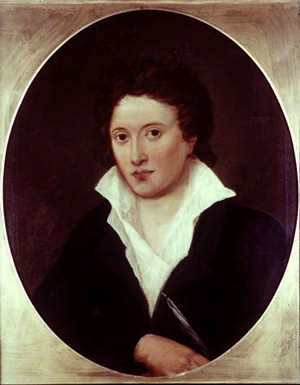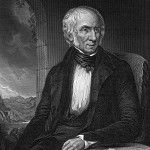IN DEFENSE OF POETRY
from The Best of the World’s Classics 1909.
 The functions of the poetical faculty are twofold; by one it creates new materials of knowledge, and power, and pleasure; by the other it engenders in the mind a desire to Poetry is indeed something divine. It is at once the center and circumference of knowledge; it is that which comprehends all science, and that to which all science must be referred. It is at the same time the root and blossom of all other systems of thought; it is that from which all spring, and that which adorns all; and that which, if blighted, denies the fruit and the seed, and withholds from the barren world the nourishment and the succession of the scions of the tree of life. It is the perfect and consummate surface and bloom of all things; it is as the odor and the color of the rose to the texture of the elements which compose it, as the form and splendor of unfaded beauty to the secrets of anatomy and corruption. What were virtue, love, patriotism, friendship—what were the scenery of this beautiful universe which we inhabit—what were our consolations on this side of the grave—and what were our aspirations beyond it, if poetry did not ascend to bring light and fire from those eternal regions where the owl-winged faculty of calculation dare not ever soar?reproduce and arrange them according to a certain rhythm and order which may be called the beautiful and the good. The cultivation of poetry is never more to be desired than at periods when, from an excess of the selfish and calculating principle, the accumulation of the materials of external life exceed the quantity of the power of assimilating them to the internal laws of human nature. The body has then become too unwieldy for that which animates it.
The functions of the poetical faculty are twofold; by one it creates new materials of knowledge, and power, and pleasure; by the other it engenders in the mind a desire to Poetry is indeed something divine. It is at once the center and circumference of knowledge; it is that which comprehends all science, and that to which all science must be referred. It is at the same time the root and blossom of all other systems of thought; it is that from which all spring, and that which adorns all; and that which, if blighted, denies the fruit and the seed, and withholds from the barren world the nourishment and the succession of the scions of the tree of life. It is the perfect and consummate surface and bloom of all things; it is as the odor and the color of the rose to the texture of the elements which compose it, as the form and splendor of unfaded beauty to the secrets of anatomy and corruption. What were virtue, love, patriotism, friendship—what were the scenery of this beautiful universe which we inhabit—what were our consolations on this side of the grave—and what were our aspirations beyond it, if poetry did not ascend to bring light and fire from those eternal regions where the owl-winged faculty of calculation dare not ever soar?reproduce and arrange them according to a certain rhythm and order which may be called the beautiful and the good. The cultivation of poetry is never more to be desired than at periods when, from an excess of the selfish and calculating principle, the accumulation of the materials of external life exceed the quantity of the power of assimilating them to the internal laws of human nature. The body has then become too unwieldy for that which animates it.
Poetry is not like reasoning, a power to be exerted according to the determination of the will. A man can not say it: “I will compose poetry.” The greatest poet even can not say it; for the mind in creation is as a fading coal, which some invisible influence, like an inconstant wind, awakens to transitory brightness; this power arises from within, like
the color of a flower which fades and changes as it is developed, and the conscious portions of our natures are unprophetic either of its approach or its departure. Could this influence be durable in its original purity and force, it is impossible to predict the greatness of the results; but when composition begins, inspiration is already on the decline, and the most glorious poetry that has ever been communicated to the world is probably a feeble shadow of the original conception of the poet. I appeal to the greatest poets of the present day, whether it is not an error to assert that the finest passages of poetry are produced by labor and study. The toil and the delay recommended by critics can be justly interpreted to mean no more than a careful observation of the inspired moments, and an artificial connection of the space between their suggestions by the intermixture of conventional expression: a necessity only imposed by the limitedness of the poetical faculty itself; for Milton conceived the “Paradise Lost” as a whole before he executed it in portions. We have his own authority also for the muse having “dictated” to him the “unpremeditated song.” And let this be an answer to those who allege the fifty-six various readings of the first line of the “Orlando Furioso.” Compositions so produced are to poetry what mosaic is to painting. This instinct and intuition of the poetical faculty is still more observable in the plastic and pictorial arts; a great statue or picture grows under the power of the artist as a child in the mother’s womb; and the very mind which directs the hands in formation is incapable of accounting to itself for the origin, the gradations or the media of the process.
Poetry is the record of the best and happiest moments of the happiest and best minds. We are aware of evanescent visitations of thought and feeling sometimes associated with place or person, sometimes regarding our own mind alone, and always arising unforeseen and departing unbidden, but elevating and delightful beyond all expression: so that even in the desire and the regret they leave, there can not but be pleasure, participating as it does in the nature of its object. It is as it were the interpenetration of a diviner nature through our own; but its footsteps are like those of a wind over the sea which the coming calm erases, and whose traces remain only, as on the wrinkled sand which paves it. These and corresponding conditions of being are experienced principally by those of the most delicate sensibility and the most enlarged imagination; and the state of mind produced by them is at war with every base desire. The enthusiasm of virtue, love, patriotism, and friendship is essentially linked with such emotions; and while they last, self appears as what it is, an atom to a universe. Poets are not only subject to these experiences as spirits of the most refined organization, but they can color all that they combine with the evanescent hues of this ethereal world; a word, a trait in the representation of a scene or a passion, will touch the enchanted chord, and reanimate, in those who have ever experienced these emotions, the sleeping, the cold, the buried image of the past. Poetry thus makes immortal all that is best and most beautiful in the world; it arrests the vanishing apparitions which haunt the interlunations of life, and veiling them, or in language or in form, sends them forth among mankind, bearing sweet news of kindred joy to those with whom their sisters abide—abide, because there is no portal of expression from the caverns of the spirit which they inhabit into the universe of things. Poetry redeems from decay the visitations of the divinity in man.
Born in 1792, drowned at Spezia, Italy, in 1822; educated at Eton and Oxford, being expelled from the latter for publishing a pamphlet on atheism; married Harriet Westbrook in 1811; met Mary Woolstonecraft in 1814, and went to live with her in Switzerland, abandoning Harriet; returned to England in 1815 and settled near Windsor Forest; joined Byron in Switzerland in 1816; in the same year, Harriet having drowned herself, he married Mary; his body consumed on a funeral pyre at Spezia in the presence of Leigh Hunt, Byron and Trelawny; published “Queen Mab” in 1813; “Alastor” in 1816; “Prometheus Unbound” in 1820; his works collected by his wife in 1830.
- 100 Screenwriting Ideas to Get You Writing - January 20, 2026
- 100 Winter Storm Writing Prompts - January 17, 2026
- 100 Haunted House Story Starters: Craft Your Scariest Tale Yet - January 10, 2026



